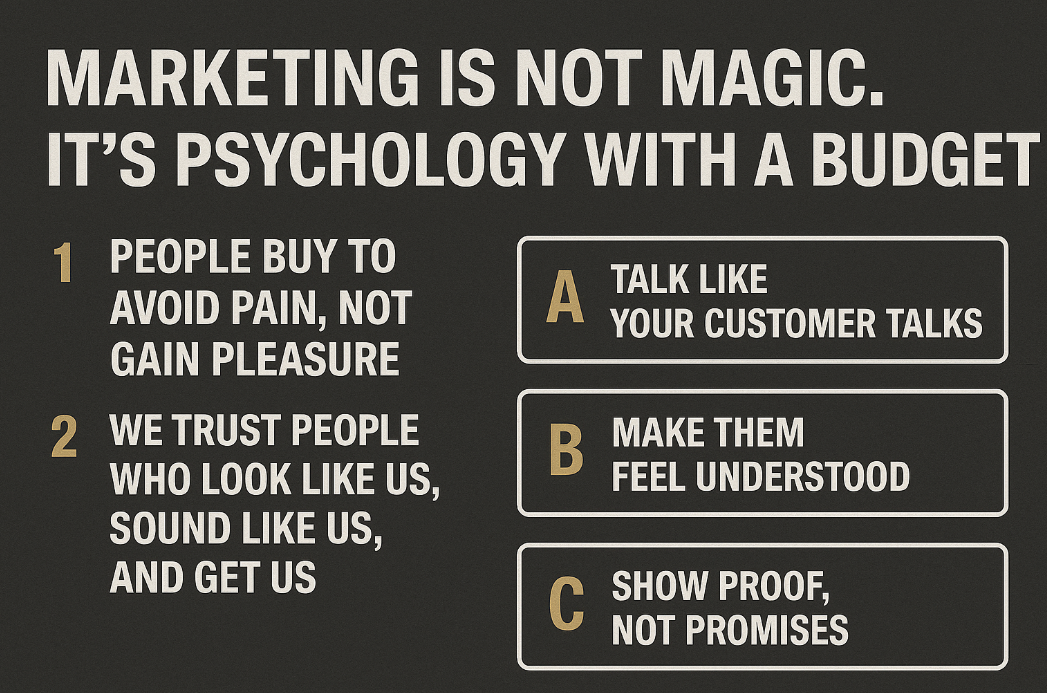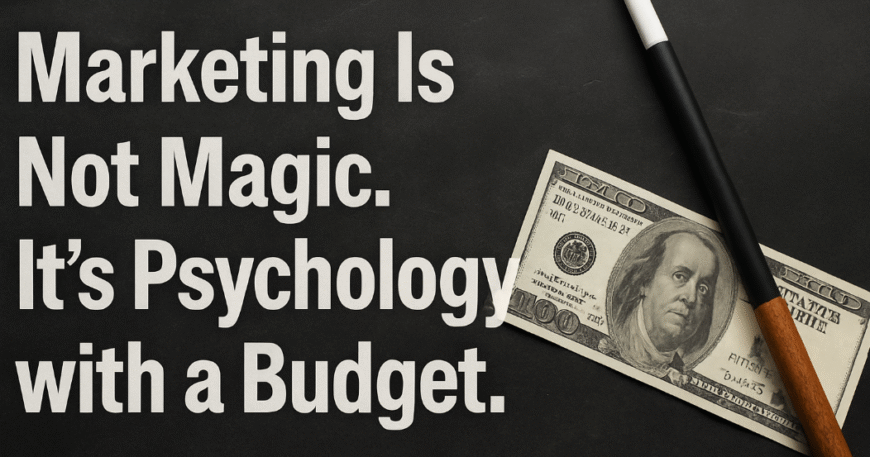Table of Contents
- You Don’t Have a Marketing Problem. You Have a Trust Problem.
- The Struggles They Don’t Tell You About in Business School
- What Even the Best Ad Can’t Fix
- Psychology 101: The Real Engine Behind Sales
- How to Apply This (Even If You’re Broke or Just Starting Out)
- Why Most Small Business Owners Burn Cash on Marketing That Doesn’t Work
- What to Do Next If You Want to Stop Guessing and Start Growing
You Don’t Have a Marketing Problem. You Have a Trust Problem.
Let’s get real for a second.
Most small business owners in the U.S. don’t wake up every morning thinking:
“Man, I need better marketing.”
No. They wake up thinking:
“Why isn’t this working? I’ve done everything right. The product is solid. The pricing is fair. The website’s live. So why am I still struggling to make sales?”
You poured your savings into this. Skipped family dinners. Took calls on weekends. And when nothing clicks? That’s not just frustrating. It’s soul-breaking.
You probably tried a few Facebook ads. Maybe even hired a freelancer. But the money disappeared faster than a paycheck at tax time. And you’re left asking:
“Is marketing just a scam?”
No. But here’s the truth:
Most marketing doesn’t work — not because it’s bad, but because it’s built without understanding human psychology.
The Struggles They Don’t Tell You About in Business School
Nobody tells you this when you register your LLC:
- How damn hard it is to get people to care.
- How even your best offer can go completely ignored.
- How you’re not just fighting competitors… you’re fighting apathy.
Most small business owners think marketing is about visibility. That if enough people see you, they’ll buy from you.
Nope.
Visibility without connection is noise.
Marketing without psychology is gambling.
What Even the Best Ad Can’t Fix
I’ve seen people spend $5,000 on “pro” video ads… and not get a single customer.
Because flashy visuals don’t matter if the message doesn’t hit.
Your customer isn’t thinking:
“Wow, nice drone shot.”
They’re thinking:
“Can this fix my problem?”
That’s why you can’t out-design or out-spend a lack of empathy. People don’t buy the best product. They buy the one they understand the fastest.
Psychology 101: The Real Engine Behind Sales
Let’s break this down. Here are a few psychological truths that drive every buying decision:
1. People buy to avoid pain, not gain pleasure.
You think people buy healthy food to “live longer”? Nah — they buy it to stop feeling like crap today. Your takeaway: Frame your product as a painkiller, not a vitamin.
2. We trust people who look like us, sound like us, and get us.
This is why local brands outperform national ones in tight-knit communities. It’s the “Hey, I know that guy!” effect. Your takeaway: Stop trying to sound big. Start sounding real.
3. We need to feel seen before we buy.
Your customer needs to feel like you understand their struggle before you pitch the solution. Your takeaway: Lead with empathy. Not offers.
How to Apply This (Even If You’re Broke or Just Starting Out)
So how do you use psychology without blowing your budget? Here’s what works:
A. Talk like your customer talks
Stop with the jargon. No one cares if your software “leverages AI-driven integrations.” Say this instead:
“It saves you 4 hours a day doing stuff you hate.”
B. Make them feel understood
Write copy that sounds like it came straight out of their head.
Not: “We offer flexible appointment scheduling.”
But: “Sick of wasting your lunch break trying to book a doctor’s visit?”
C. Show proof, not promises
Screenshots. Reviews. Testimonials. Before-and-after photos.
If you say it, it’s marketing. If they say it, it’s proof.

Why Most Small Business Owners Burn Cash on Marketing That Doesn’t Work
Because they skip the foundation and jump straight into the tactics.
They ask:
- “Should I run Instagram ads?”
- “Is TikTok better than YouTube?”
- “Should I hire an agency?”
None of that matters until you nail your psychological positioning.
Here’s the real checklist:
✅ Do I know what my customer is afraid of?
✅ Do I know what they say they want vs. what they really want?
✅ Am I speaking in their voice, not mine?
✅ Am I building trust before asking for the sale?
If you’re not clear on these — no ad, no funnel, no growth hack will save you.
What to Do Next If You Want to Stop Guessing and Start Growing
Here’s the good news: You don’t need a huge budget. You just need a better lens.
Marketing isn’t magic.
It’s not about being louder.
It’s about being understood.
So before you post another reel, buy another ad, or launch another campaign…
Ask yourself:
“Do I truly understand what my customer is feeling before they find me?”
Because when you get that right — your marketing doesn’t feel like marketing.
It feels like someone finally gets them.
And that’s when they buy.
Final thought:
If you want marketing that works, stop thinking like a marketer. Start thinking like a human. Your customers already are.



